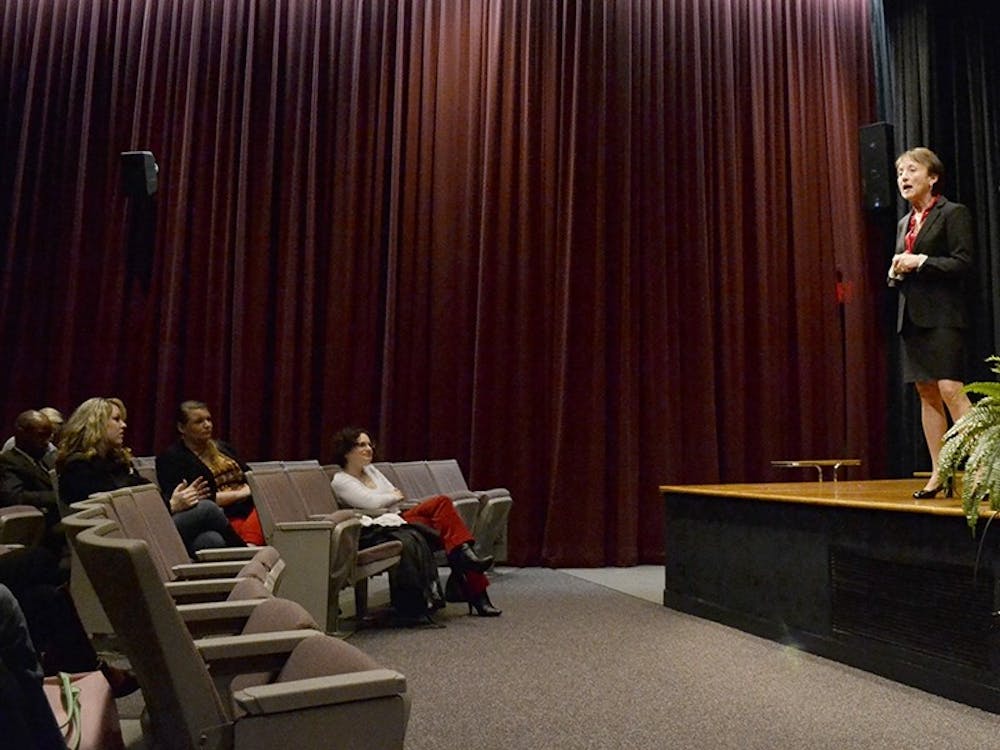Judge is 1 of 2 women to ever serve on SC Supreme Court
South Carolina Supreme Court Justice Kaye Hearn stepped away from the microphone, choosing to ditch the podium and take a more personal approach with the crowd.
“Everyone can hear me?” she asked. “That’s never been my problem.”
But she’s overcome problems in her rise to being one of the state’s five justices. Speaking to a 17-person crowd at the Russell House Ballroom Monday night, she told her story of being a female in a male-dominated profession, losing her tutu to go to law school at USC.
Growing up in small-town Pennsylvania, Hearn wanted to be a ballerina, but she fell in love with history and came to the University of South Carolina to study law. At the time, she said only 20 percent of the students at the law school were women.
Hearn said professors would address the class as, “Good afternoon, gentlemen,” before begrudgingly adding “and ladies.” She and South Carolina Supreme Court Chief Justice Jean Toal are the only two women ever elected to the state’s highest court. Toal was originally booked to be the speaker for the event but had a conflict, asking Hearn to take her place.
Hearn said she nearly missed out on a job opportunity as a law clerk in Bamberg, S.C., because the judge didn’t want a female. Hearn said she quickly responded, “Well, you’ll have to talk to God about that.” After she was hired, she said the judge told her the retort was the reason he changed his mind.
Hearn practiced law in Loris, S.C., before running to be a judge in family court. She was later elected as an appellate court justice and became the chief judge of the South Carolina Court of Appeals the year before Toal was named Supreme Court chief justice.
“I’m interested in going the law route, but I never saw myself as a judge so I wanted to hear her perspective of it,” said Tasha Sanders, a first-year political science student.
Ciera Barrow, a first-year dance student, said she is looking for a second major, so Hearn’s story “hit a personal note.”
Needing three tries to be elected to the Supreme Court, Hearn takes pride in being the chair of the docket management task force. She headed subcommittees for family court, criminal court and civil court. After her lecture, she said one of the most significant reforms of the task force has been taking control of the docket away from the solicitors in general sessions. South Carolina was the only state in the country that still let the solicitors — a party to the litigation — control the litigation.
“If the solicitor was fair-minded and even-handed, it was fine, but sometimes there were abuses,” Hearn said. “As it happened, that was the big recommendation from the general sessions subcommittee, and then, lo and behold, a case percolated its way up to us where the public defenders had asked that the statute that gave control of the docket to solicitors be held unconstitutional, and we did. I wrote the opinion.”
In Toal’s State of the Judiciary speech last year, she said the court would move to an e-filing system within two years. Hearn said in her “reading and writing job” of being a Supreme Court justice, she can now look at all of her cases on an iPad.
Reading cases can often be difficult for Hearn, especially when they’re gruesome, murderous ones. The court has recently ruled on broader state issues. In 2009, it ordered then–Gov. Mark Sanford to apply for a disputed $700 million in federal stimulus aid. Then in 2011, the court refused Gov. Nikki Haley’s order to call lawmakers for an extra session.
“We are oftentimes called upon,” Hearn said. “The general assembly makes the laws, but we’re sometimes called upon to interpret it. Those are interesting issues that we’ve had.”

